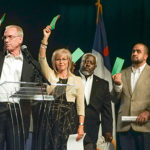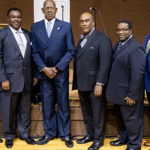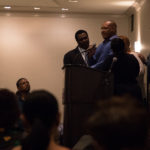Is claiming African-American Baptist churches emphasize community action and community ministry more than their Anglo counterparts accurate? If so, why and how has this emphasis become so integrally woven into the tapestry of African-American churches?
Historian Edward Wheeler has suggested the African–American church agenda, from its beginning as an independent church, has been greatly concerned about the “uplift of the race.”
Without the societal and government services now available, there was no other assembled organization that could care for the needs of the people but the church. The church and its members looked after the hungry, the homeless, the ill, the unclothed, the untrained, the illiterate, the widows and orphans, and people afflicted by a host of other maladies that beset human-kind. There has been an “ought-ness” about responding to the needs of others, both as an act of humanity and in obedience to the love of Christ.
‘Poor saints’ offering
I vividly recall the church of my youth and other African-American churches with which I was acquainted receiving a “Poor Saints” offering. It is now a mission or benevolence offering, but the intent remains the same—to provide a way of assisting those in need. The plethora of government agencies and programs has reduced the emphasis in some churches, but not totally.
In addition, other independent organizations and businesses developed in response to addressing human needs. They included burial societies, lodges, clubs and private organizations, insurance companies and banks, and benevolent clubs. All of them responded to meeting human need. In time, churches formed Baptist associations and conventions for addressing these needs. Long before the governments took an interest in education for African-Americans, the churches—both individually and collectively—became the fund raisers for education from grade school through college.
We often hear the term HBUCs—historically black universities and colleges. These were church-sponsored institutions sometimes resulting from the collective work of associations and conventions. It should be noted that white Baptists of the North, along with other benefactors, were instrumental in helping these schools get started and have continued support.
Morehouse College, for example, met at Friendship Baptist Church until it was able to secure land of its own. Morehouse was established for African-American males by whites from the North. Spellman College was founded in Friendship Baptist Church in a similar way for young women. There was a time when HBUCs numbered in the hundreds. The Civil Rights movements opened all public facilities to all people and removed the strain of churches in funding African-American education.
‘Uplift of the race’
Sign up for our weekly edition and get all our headlines in your inbox on Thursdays
In the founding of the National Baptist Convention of America (1895), three former conventions of emphases were merged—the Baptist Foreign Mission Convention (1880), the American National Baptist Home Mission Convention (1886) and the National Baptist Education Convention (1893). This larger convention became the collector of receipts and the promoter of programs and emphases for the uplift of the race.
The question is often asked, “Why aren’t African Americans more interested in missions abroad”? The answer has been very simple. We have been carrying the burden of needs for the “uplift of the race” in America.
Emmanuel McCall, interim pastor, Friendship Baptist Church
Adjunct faculty member, McAfee School of Theology
Atlanta, Ga.
If you have a comment about this column or wish to ask a question for a future column, contact Bill Tillman, consulting ethicist for “Right or Wrong?” at [email protected].














We seek to connect God’s story and God’s people around the world. To learn more about God’s story, click here.
Send comments and feedback to Eric Black, our editor. For comments to be published, please specify “letter to the editor.” Maximum length for publication is 300 words.